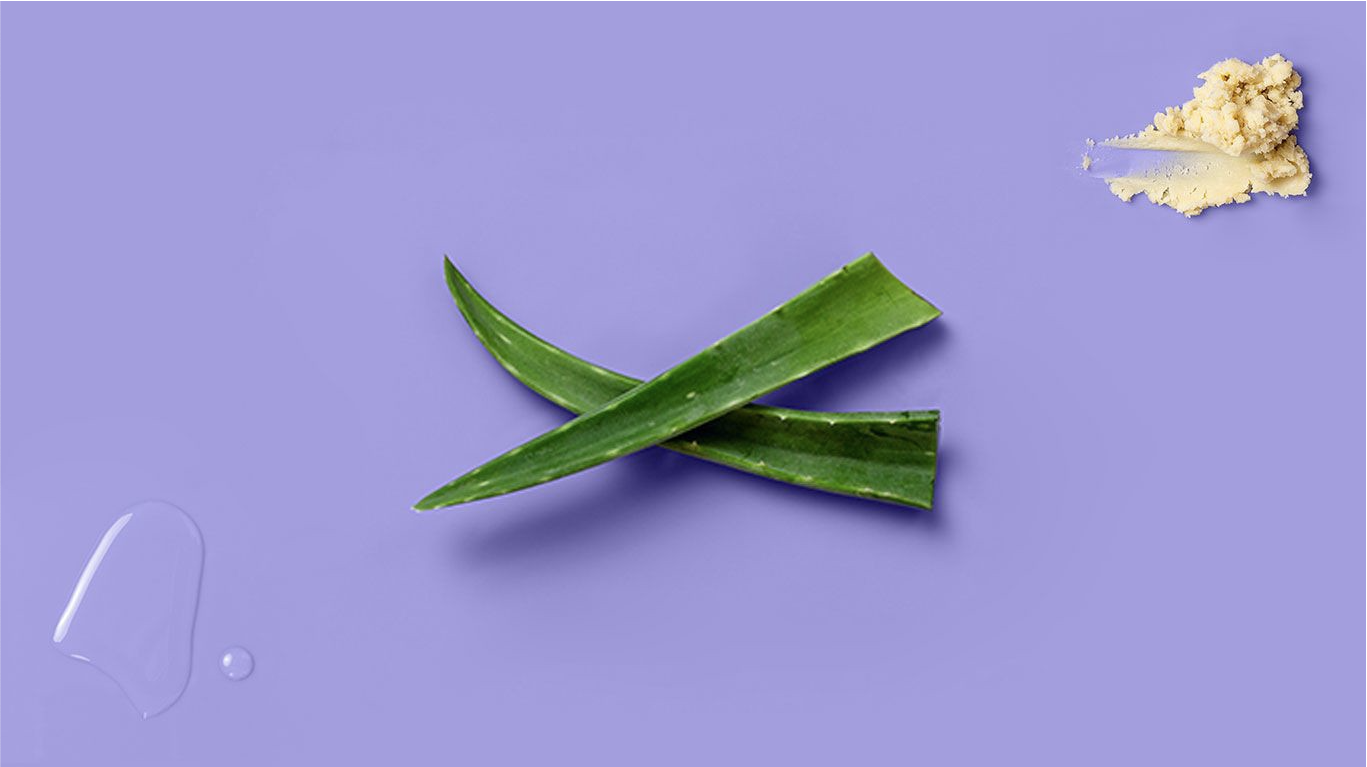How it works:
Share your skin goals and snap selfies
Your dermatology provider prescribes your formula
Apply nightly for happy, healthy skin
How it works:
How it works:
Share your skin goals and snap selfies
Your dermatology provider prescribes your formula
Apply nightly for happy, healthy skin
How it works:
Are natural ingredients the best?
The truth about natural skincare products.



Harvesting raw aloe in my backyard with a machete makes me feel like a powerful cavewoman, and I’m not alone in this feeling. Clean, natural, organic products aren’t a new beauty trend — these terms come from conscious-consumer movements that span decades. But ingredient geeks like me get a little flustered when people say things like “chemicals are bad for skin.” Everything we can touch is made up of chemicals! The reality of “good” and “bad” skincare ingredients is a little more nuanced.
Head’s up! “Natural” does not mean “better” or “safer.” Same goes for terms like “organic.” You wouldn’t want to rub poison oak all over your face just because it grows in the forest without pesticides! Likewise, ingredients in your pantry aren’t necessarily safe for skin. For example, coconut oil can actually clog pores, and lemon juice can be irritating. Now that I’ve gotten that out of the way, let’s dive into the nitty gritty of what these terms actually mean.
Understanding clean, natural, and organic skincare
If you’re an eco-conscious consumer, animal lover, or have sensitive skin, then you care about the ingredients in your skincare products. The bad news: the FDA doesn’t regulate terms like “natural ingredients,” so you can’t necessarily trust how brands advertise their products.
The good news: products can be reviewed and certified by 3rd party organizations to meet certain criteria. Certified products have the organization’s seal of approval on their label, making them easy to find. Anyone can start one of these organizations (including the very stores trying to get you to buy — more on this in a second). That means it’s up to us to do our homework to make sure a certification aligns with our personal standards.
These are currently some of the most popular seals of approval in skincare:
USDA Organic. If a product’s ingredients are at least 95% certified organic (meaning derived from plants grown without pesticides), it will bear an official USDA organic seal.
Leaping-Bunny Certified. If you’re looking for products that aren’t tested on animals, look for the leaping bunny on the label.
Certified Vegan. Vegan Action certifies products that aren’t tested on animals and don’t contain any ingredients derived from animals.
Certified Fair Trade. The Fair Trade Movement promotes social justice for workers in developing countries. There are many different organizations that offer fair trade certification by their own standards, including Fair Trade Certified, the World Fair Trade Organization, and Fair Trade America.
EWG Verified means a product meets the Environmental Working Group’s standards for safe products. That means it’s free of chemicals from their “unacceptable” list, which are known to have health, ecotoxicity and/or contamination concerns.
Clean at Sephora means a product meets Sephora’s standards for clean skincare and makeup. These products must have less than 1% synthetic fragrance and be free of more than 50 ingredients. You’ll only see this certification while browsing Sephora, which makes it different from the others on this list.
Clean at Sephora is just one example of businesses forming their own in-house certification system — it’s more common than you think! In my opinion, these certifications aren’t as reliable as ones from truly independent organizations. But at the end of the day, there’s nothing wrong with buying into these certifications if their standards align with yours.
The best natural ingredients for skin
If you like your skincare straight from the source, I hear you! After all, skincare routines have been around since ancient history — long before synthetic ingredients existed. In my opinion, these four natural ingredients are the best for skin:
Aloe has anti-inflammatory effects¹ and antiseptic properties,² which can help soothe certain skin problems, like acne. Rubbing raw aloe vera on the skin can feel very soothing and cooling, which makes it great for sunburns.
Clay helps absorb oil and physically exfoliate the skin.³ There are tons of obscure and exotic-sounding clays that are used in skincare masks, but they’re usually derived from bentonite, kaolin, or illite clay.
Honey is a natural humectant, which draws water from the air onto the skin to boost moisture. It’s also been shown to have antibacterial properties. Be sure to use medical-grade honey, as regular honey has less predictable benefits.⁴
Oats have antioxidants, which help soothe itchy skin. Oats also help to improve the skin’s moisture barrier function.⁵ I recommend using colloidal oatmeal (which you can make by grinding up dry, non-instant oatmeal).

Start your free trial today (plus shipping and handling)
Skincare ingredients to avoid
Even certified products can be potentially pore-clogging or irritating. And, unfortunately, lots of ingredients found in the wild (or in your pantry) can potentially cause breakouts or irritate the skin. (I’m looking at you, coconut oil!) Although everyone reacts differently, if you’re acne-prone or have sensitive skin, you may want to skip these ingredients:
Alcohol Denat., a.k.a. Specially Denatured (SD) Alcohol (irritating)
Acetylated Lanolin Alcohol (pore-clogging)
Algin (pore-clogging and irritating)
Carrageenan (pore-clogging)
Cetyl Acetate (pore-clogging and irritating)
Cocoa butter (pore-clogging)
Cocos Nucifera Oil, a.k.a. Coconut Oil (pore-clogging)
Ethylhexyl Palmitate (pore-clogging)
Fragrance (may cause irritation)
Glyceryl Stearate SE (pore-clogging)
Glycine soja oil, a.k.a. soybean oil (pore-clogging)
Hydrogenated Vegetable Oil (pore-clogging)
Isopropyl Myristate (pore-clogging and irritating)
Isopropyl Palmitate (pore-clogging)
Laureth-4 (pore-clogging and irritating)
Lauric acid (pore-clogging)
Myristic acid (pore-clogging)
Myristyl Myristate (pore-clogging)
Octyl Stearate (pore-clogging and irritating)
Polyglyceryl-3-Diisostearate (pore-clogging)
Potassium Chloride (pore-clogging and irritating)
Propylene Glycol Monostearate (pore-clogging)
Red algae (pore-clogging)
Sodium Lauryl Sulfate, a.k.a. SLS or sodium laureth sulfate (pore-clogging)
Sorbitan Oleate (pore-clogging)
Wheat Germ Oil (pore-clogging)
…And that’s just a start. Please keep in mind, though — this list is not absolute! What causes clogged pores or irritation in one person might not cause it in another.
If you’d rather take the guesswork out of it, you can sign up for a free month of Curology. All of Curology’s products are designed by our in-house dermatologists to be non-comedogenic, fragrance-free, dye-free, paraben-free, and hypoallergenic. Curology is 100% cruelty-free and vegan (we’re Leaping Bunny Certified!). Curology uses BPA-free packaging, and all of our products are made in the USA. If you’re not already a Curology member, go ahead and try it for free! You’ll just pay $4.95 (plus tax) to cover shipping and handling.
P. S.
We did our research so you don’t have to.
Kavitha K. Reddy, et. al. Common complementary and alternative therapies with potential use in dermatologic surgery: risks and benefits. Journal of the American Academy of Dermatology. (April 2013).
Prakash P Athiban, et al. Evaluation of antimicrobial efficacy of Aloe vera and its effectiveness in decontaminating gutta percha cones. Journal of Conservative Dentistry. (June 2012).
Lynda B. Williams and Shelley E. Haydel. Evaluation of the medicinal use of clay minerals as antibacterial agents. International Geology Review. (2010, January 18).
Kavitha K. Reddy, et. al. Common complementary and alternative therapies with potential use in dermatologic surgery: risks and benefits. Ibid.
Kurt A Reynertson, et al. Anti-inflammatory activities of colloidal oatmeal (Avena sativa) contribute to the effectiveness of oats in treatment of itch associated with dry, irritated skin. Journal of Drugs in Dermatology. (January 2015).

Stephanie Papanikolas